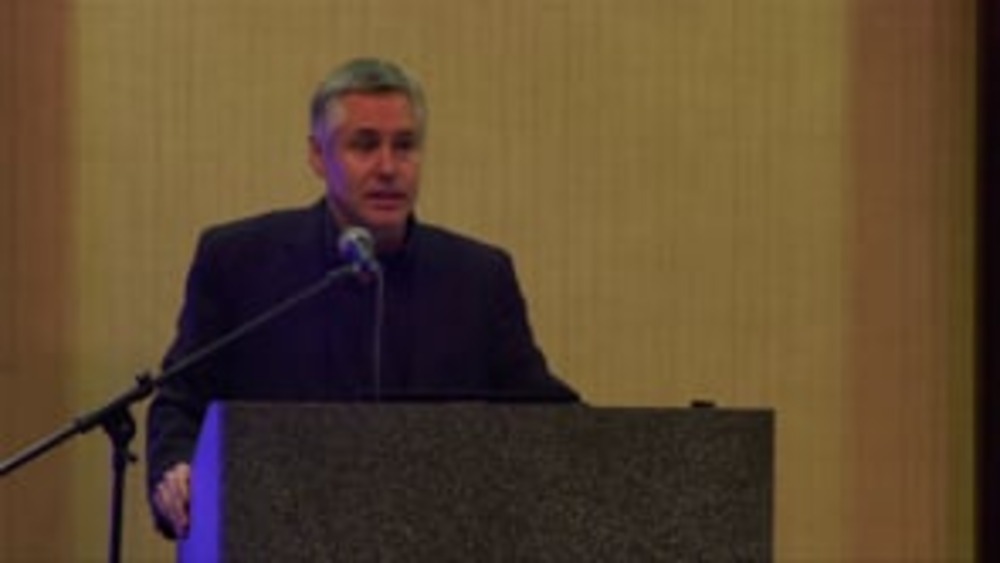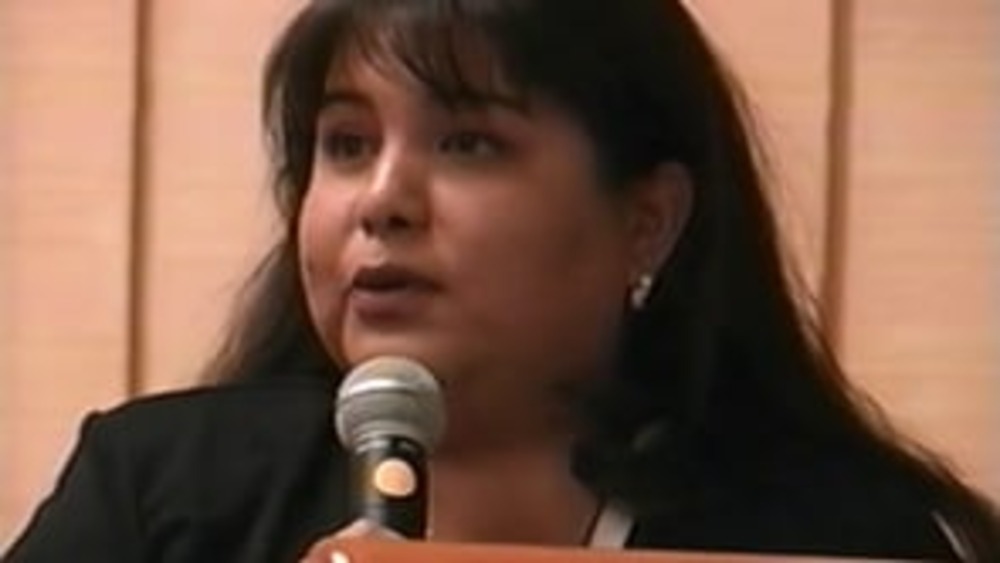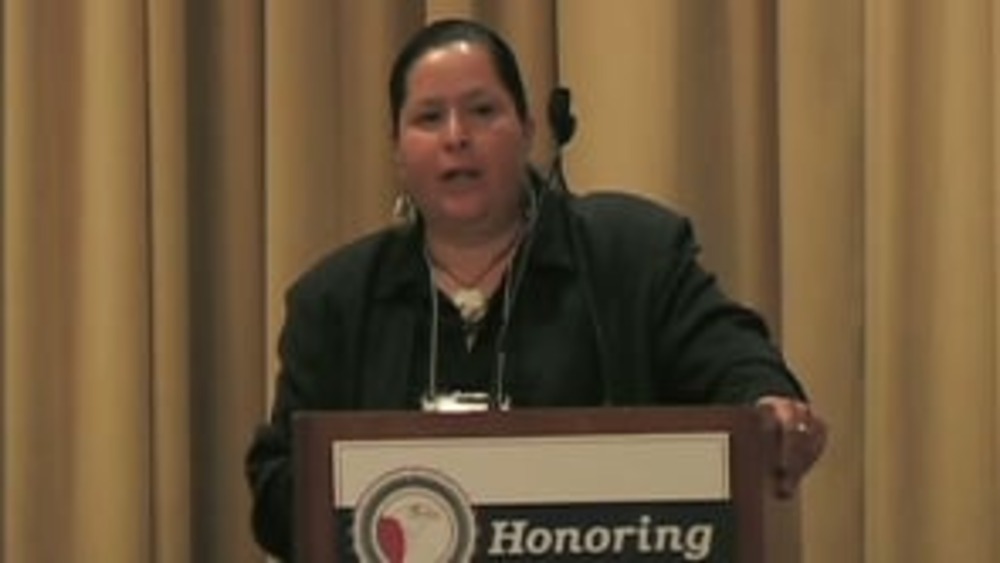JoAnn Chase reports back to her fellow Honoring Nations sympoisum participants about the consensus she and her fellow cultural affairs breakout session participants reached concerning the need for Native nations to fully integrate culture into how they govern, and also to ensure that their governance activities strengthen their cultures.
Additional Information
Chase, JoAnn. "Cultural Affairs." Honoring Nations symposium. Harvard Project on American Indian Economic Development, John F. Kennedy School of Government, Harvard University. Sante Fe, New Mexico. February 9, 2002. Presentation.
Transcript
JoAnn Chase:
"Good afternoon everybody. As Heather [Kendall-Miller] helps put some of the notes from today's discussion that we had up there, I couldn't help but just look outside and see the beautiful blue skies today and another gorgeous day in Santa Fe, New Mexico, and just really give thanks for the opportunity to come together and meet together and gain from and learn with one another and exchange knowledge base and we thank you for the food that we have and for each other. So that may be a really appropriate way to start off our report on some of the really vibrant and terrific discussion that we had about cultural affairs programs.
We came to a simple bottom line, and I think it almost summarizes the whole extent of our discussion, which is that as we talk about building successful Indian nations, we cannot build Indian nations without a strong comprehensive fully integrated cultural component. And so the discussion, we actually engaged in some detailed discussion, but citing some examples just to the Honoring Nations of really driven cultural programs that are models for us to look at. The Ojibwe language program, for example, at the Mille Lacs Band of Ojibwe; the Elders Advisory Council for the San Carlos [Apache] Tribe; the Navajo Nation Archaeology Department at Navajo Nation; the Poeh Cultural Center for Pojoaque [Pueblo] that some of us will have the privilege of visiting today; the Navajo Studies Division at Navajo Nation are just among some of the examples of really terrific things that are being done.
Lots of our discussion actually centered around language, and language preservation being such a key component of who we are as Indian people. And somebody I think summarized it so appropriately that said, 'Without language we don't have culture,' and yet we face the challenge in so many of our communities of losing those languages. So how do we break down some of those internal barriers that exist? How do we break through some of the imposed structures that are upon us? We can't just rely on our school systems. Our school systems don't necessarily serve our families. What kinds of creative thinking can we do, and think beyond those imposed structures that we have had to exist under, so that we can in fact have language programs that involve intergenerational components and that involve our families collectively? Much of the discussion was also around it is so important to involve the entire family in the language process.
We talked about some ways of just preserving and protecting and maintaining language including taking the initiative to control our own schools, to make our own laws. Somebody in our group said that their tribe actually had...was [unintelligible]. I believe it was Marge Anderson at Mille Lacs that, in order to graduate from the school system, one had to have proficiency in the language and demonstrate fluency. With that bold move by the tribe and certainly then the program to support that so that that can happen. Involving speakers with the very young, we mentioned that; promoting pride in being Native and using the Native language. There was an example of a group of young people who, first graders who stepped out and sang songs in their own language and actually integrated some Western culture with some sort of rap overtones. And we asked Chairwoman Anderson to demonstrate for us. She refused to do that, but nonetheless, the point I think was so well taken that the language itself instills the pride and is such an important component of maintaining that pride and that the young people, the transformation, as they became more proficient in the language was so apparent the way they held themselves, the way they communicated, the brightness in their eyes and just the general happiness with who they are, which clearly related to their ability to speak the language. We know that's so tremendously important in maintaining our cultures.
We talked basically about strategizing to reach out to families, again breaking down some of those boundaries that exist and thinking creatively. After-school programs, evening programs, weekend programs so that we are indeed involving our families, concentrating on some of the internal mechanisms within tribes.
We talked about thinking beyond basic boundaries and we know that there's some wonderful programs out there. We have relatives that boundaries that exist have been imposed upon us and recognizing that they've been imposed, thinking beyond them, reaching to our relatives in Canada, reaching to our relatives in Mexico, looking outside again in supporting and exchanging our culture. Again, integrating those aspects of our culture into the...a comprehensive approach to building nations.
Let's see if I'm missing things here. We talked so much about language and why it was important. Then we actually then transitioned to some really important conversation about economics and we know that there are so many economic challenges for tribes. In fact, so much of this program about nation building is concentrated on engaging in initiatives and tribes being forced to sometimes make some difficult decisions about economic initiatives so that they actually can continue to build the nation. And the importance of recognizing that culture may not immediately...incorporating components of culture into a comprehensive nation-building strategy may not have immediate quantitative economic returns, but that certainly there are many, many returns that through a qualitative analysis bring tenfold back to the tribe and that, importantly, that if we look over the longer term of economic analysis we do see that cultural components built into nation building, in fact, do have economic returns, and encouraging that kind of thinking so that we aren't forced into decisions of we're not going to support the culture because we don't see the dollars immediately. These cultural components are a drain on our economic development initiatives. Clearly we know that that's not to be true and to continue to take measures that defy some of those thinking that we know really are conclusions that in the long run prove not to be true at all.
We talked about things like bringing artists together, thinking again creatively, reaching outside of our communities, involving, as I said, intergenerational components between elders and youth and so on. And then we talked a little bit about tribal politics and the necessity of getting tribal leaders involved and committed to cultural programs and recognizing of course that tribal leaders certainly have...are pulled in so many directions these days -- they need to be in Washington, they need to be working with state legislatures and so on -- but that, indeed, if they are not committed to the cultural programs and cultural adaptations that there is a real shortcoming in the kind of leadership that they're providing to the tribe. Basically it came down to walk the talk. There's some danger in a lot of rhetoric among particularly tribal governmental elected officials of supporting culture but not necessarily taking the appropriate actions to support that culture. Again bold steps like promulgating laws that incorporate culture into the overall development of our nations is clearly important. And so there was some very provocative discussion around that, making sure that we hold tribal leaders accountable to the kind of rhetoric and at the same time making sure that we do take the measures that we can to ensure that our elected officials are engaging and participating and supporting necessarily various cultural initiatives.
We talked a little bit about tourism and involving outside communities in our cultural affairs and how that can be creatively done. Of course we know that there may be some dangers, we've seen some of our initiatives taken from us, exploited, exported in ways that aren't healthy to us, but indeed, with careful thought there are some wonderful things that can happen so that not only are we building the culture within, but that we're also contributing to the broader fabric of society as well. Some strategies: we talked about using crisis to our advantage to teach and to pull in culture. It's that which sustains us to get us through those difficult times and we know that there's a lot of crisis in Indian Country so reaching to those foundations that keep us strong. Be opportunistic and look for opportunities to interject ideas and principles that come from culture, taking advantage of the situation, seizing the initiatives. Create formal roles for cultural leaders that bring their advice and ideas to the forefront. We mentioned the San Carlos [Apache] Elders Council as a perfect example of that and obviously they play a tremendously important role in the tribe. Funding, staffing, equipment and training for cultural centers, because clearly there's a service to those communities and we know that we need to be aggressive in seeking ways that we actually are able to provide funding and staffing and equipment. Those seem to be challenges for us all of us in so many programs but we must continue to pursue ways to actually ensure that there is that kind of training, there is the kind of equipment, there is the support necessary.
I think that's predominately the essences of the conversations that we had and I can say one more time, all those wonderful points and strategies really boil down to one main point and that is that we cannot build Indian nations without a very strong, a very comprehensive and a wholly integrated cultural component."



